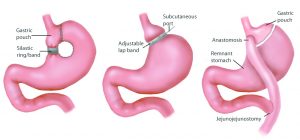 Weight loss isn’t a quick jaunt; it’s often a very long expedition with many turns, twists, and bumps in the road. At this time of year, after our New Year’s resolutions have gone by the wayside, we’ve probably lost a few pounds, only to regain them over the past few months. Now with the summer season here, many of us will feel a bit more self-conscious about wearing shorts and swimsuits because, in this heat, we can no longer hide under our clothing.
Weight loss isn’t a quick jaunt; it’s often a very long expedition with many turns, twists, and bumps in the road. At this time of year, after our New Year’s resolutions have gone by the wayside, we’ve probably lost a few pounds, only to regain them over the past few months. Now with the summer season here, many of us will feel a bit more self-conscious about wearing shorts and swimsuits because, in this heat, we can no longer hide under our clothing.
The big concern isn’t regarding those folks that need to loose a few superficial pounds to feel more confident; it’s for those individuals that qualify as obese. Obesity is much more common than most of us would like to believe.
What quantifies obesity? There are several ways to measure your risks. Some are physically calculable, while others are established by physical symptoms affecting your health.
When determining your risks, your BMI (Body Mass Index) is a good place to start. Based on your height and weight, if your calculations are over 30 BMI then you are thought to be obese. Taking into consideration that humans come in all shapes and sizes, there are other tests that practitioners will include in your obesity estimates, like waist to hip ratio (WHR) and waist to height ratio (WHtR) measurements.
Obesity calculations:
• WHR-Waist to Hip = Waist ÷ Hip
– Women > 0.85
– Men > 0.90
• WHtR-Waist to Height Ration = Waist ÷ Height
– Women and Men > 0.5
Why are these measurements so important? People that are overweight, especially in the midsection are prone to secondary health complications.
Large midsections very often contain visceral fat, which is deep within the organs. Some of the contributing health issues and disorders are as follows:
• Hypertension (high blood pressure)
• High cholesterol
• Coronary heart disease
• Vascular disease
• Diabetes
• Stroke
• Arthritis
• Sleep apnea
Losing weight is the obvious solution, but it’s often not without challenges. Clearly we need to diet and exercise, but for individuals that are obese, this is much harder to achieve and maintain than it is for those at a healthy weight. When diets and exercise fail, Bariatric surgical procedures can literally save your life.
According to the ASMBS (American Society for Metabolic and Bariatric Surgery), “…there are significant biological differences between someone who has lost weight by diet and someone of the same size and body composition to that of an individual who has never lost weight. For example, the body of the individual who reduces their weight from 200 to 170 pounds burns fewer calories than the body of someone weighing 170 pounds and has never been on a diet. This means that, in order to maintain weight-loss, the person who has been on a diet will have to eat fewer calories than someone who naturally weighs the same. In contrast to diet, weight-loss following bariatric surgery does not reduce energy expenditure or the amount of calories the body burns to levels greater than predicted by changes in body weight and composition. In fact, some studies even find that certain operations even may increase energy expenditure. In addition, some bariatric procedures, unlike diet, also cause biological changes that help reduce energy intake (food, beverage).
• Bariatric Surgery and Hormonal Changes
Hormonal changes following bariatric surgery improve weight loss by maintaining or enhancing energy expenditure (calories burned). In fact, some surgeries even increase energy expenditure relative to changes in body size. Thus, unlike dietary weight loss, surgical weight loss has a higher chance of lasting because an appropriate energy balance is created.”
There are several different forms of bariatric procedures available depending on your needs, health risks, and physician’s recommendations. Some are minimally invasive and temporary, while others are more involved and permanent. The results of weight lost and long-term outcomes are what keep bariatric procedures on top of the list for medical professionals when treating obese patients.
Bariatric Surgery Advantages
• Up to 90% loss of excess fat
• Higher ability to keep the weight off
• Reliable
• Cardiovascular improvements
• Diabetes remission
• Alleviates sleep apnea
• Decreases stroke risk
• Reduces heart disease
• Offsets depression
• Lessens Joint pain
Gut hormones impact blood sugar, hunger, and satiety. Once the stomach is made smaller, these gut hormones begin to self-regulate, making the individual less hungry, having an overall sense of fullness and satisfaction, as well as controlling blood sugar levels, which lead to less fat storage.
If you or a loved one have any health concerns related to obesity, please consult Munroe Bariatrics about your weight loss plan of action to get you to a healthy goal weight and to keep you there.
Munroe Regional Medical Center/Bariatrics
(352) 671-2099
Munroeregional.com
Check Also
CUSTOMIZABLE LIGHT ADJUSTABLE LENS A GAMECHANGER FOR CATARACTS PATIENTS
All Americans have some degree of cataract change by the age of 75. As the …
 Central Florida Health and Wellness Magazine Health and Wellness Articles of the Villages
Central Florida Health and Wellness Magazine Health and Wellness Articles of the Villages



